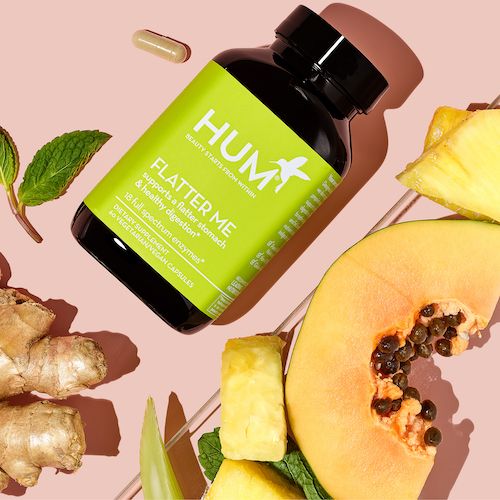Feeling bloated but don’t know why? Now that we’ve learned about the importance of gut health, let’s dive into some common questions surrounding bloating and digestion.
“Most of us have heard that dietary fiber promotes healthy digestion,” says Splendid Spoon’s Registered Dietitian, Johane M. Filemon, MS, RDN, CLT. “Foods such as oats, beans, apples, barley, nuts, green beans, potatoes are all great sources of fiber. The consumption of fiber, with adequate fluid consumption, works to help your bowels move.”
“What people don’t often know is that exercise is also a great way to support digestion, too! Exercise, especially cardio exercises can help speed up the time that food is spent passing through the digestive tract.”
We partnered with HUM Nutrition’s Registered Dietitian Gaby Vaca-Flores, RD to take a closer look at what to do about bloating.
What are the most common ingredients/foods that cause bloating?
- Beans + lentils
- Fizzy drinks
- Cruciferous veggies
- Wheat (if gluten intolerant)
- Dairy (if lactose intolerant)
Is bloating (temporarily) a bad thing? Should we always avoid foods that make us bloat or is it a normal thing to experience?
Not to worry, bloating is usually a normal (albeit uncomfortable) part of the digestion experience. For most people, post-meal bloating is not a cause for eliminating foods altogether from your diet and it can usually be addressed with minor dietary modifications. We also can feel bloated if we overeat, as the extra pressure on our stomach causes the sensation of bloating, even if we aren’t.
However, when bloating is severe or accompanied by other symptoms like vomiting or significant weight changes, it can be a sign of a more serious problem in which case you should consult with your doctor.
What are digestive enzymes and how do they affect digestion?
Digestive enzymes are a group of enzymes that help break down the major nutrients in our food such as protein, carbohydrates, and fat. They are naturally found within the digestive tract. For people who experience frequent post-meal bloating, supplementing digestive enzymes can be very beneficial. My favorite is HUM’s Flatter Me formula which combines 18 full-spectrum digestive enzymes.

What can someone do to counteract bloating?
If you find yourself regularly feeling bloated after eating, it can be helpful to take a closer look at your meals to see where you can make small dietary changes. Some things to look out for include:
- Are you eating too much fiber?
- While fiber is necessary for good gut health, too much fiber too fast can contribute to bloating. Easing your intake of some high fiber may provide relief from bloating. Examples of high fiber foods include lentils, beans, and whole grains like certain breads, pastas, and cereals.
- What are you sipping on?
- Fizzy drinks get their fizz from gas bubbles- the extra gas adds air to your digestive tract, which can lead to bloating. Keeping carbonated waters and sodas at a minimum can result in less bloating.
- Are you eating cruciferous veggies?
- Surprisingly, some healthy vegetables may cause significant bloating for some. Cruciferous veggies like broccoli, Brussels sprouts, cabbage, and cauliflower are high in FODMAPs, a group of fermentable carbs that can lead to bloating in some people. Swapping them out with other types of vegetables can help you feel less bloated after eating.
Have questions? Check out the work Gaby and the Hum Nutritionists are doing to help everyone reach their health goals! Ready to get started with deliveries of plant-based and fiber rich meals? Sign up for one of our plans today!
